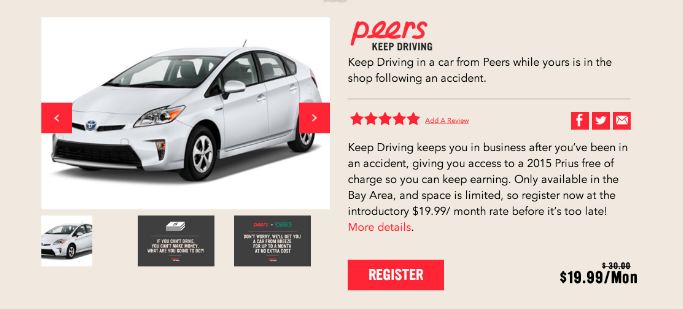Peers, a platform that caters to workers in the sharing economy, is launching its first two products. One is a $1 million insurance coverage option for regular Airbnb hosts. The other is a program for Uber, Lyft and other ridesharing drivers that will provide a replacement vehicle for them if their own car should break down or get in an accident.
“The basic business model for business built on top of the sharing economy has always been to treat workers as individual contractors,” mentions Peers CEO Shelby Clark. “This leaves a lot of gray area and the individual worker often defenseless and without resources.”
Airbnb and VRBO hosts had to get expensive bed and breakfast liability coverage for accident or damage before. The Peers program covers up to $1 million and costs $36 per month. Homesharing liability insurance also includes up to $5000 in compensation for lost income as a result of damage by a guest or their invitee.
The ridesharing product, Keep Driving, gives workers a way to keep earning while their own car is in the shop. It’s the difference between losing both a large source of income on top of the car repair costs and being able to pay the rent. Peers partnered with car leasing company Breeze to give members access to a short-term leased vehicle for up to a month. The membership to this program is $19.99 per month and only available in the Bay area for now.

“While sharing economy workers are finding new ways to fill their income gaps, they are also encountering challenges they’ve never had to deal with before,” says Clark. “By combining the collective purchasing power of the Peers community, Peers is able to pioneer innovative solutions to new problems. Sharing economy workers are not alone, and they shouldn’t feel that they need to navigate these issues alone.”
My Lyft driver confirms the Keep Driving program would be helpful for him. He didn’t want to be identified, but does a bunch of different sharing econ type jobs to pay rent on his one bedroom near Dolores Park in San Francisco. My driver admitted he’s carts folks for both Uber and Lyft and starting delivering for SpoonRocket recently (it’s looked down on to drive for more than one rideshare service). “Every driver I know drives for several companies or delivers food or also works for Taskrabbit or something.” He told me now is a good time to get into the delivery industry but not car sharing. “The holidays means more people want to stay home and get food delivered instead so SpoonRocket, GrubHub, Postmates, those are all good right now.” While he hasn’t been in an accident, he admitted that would be the difference between making the rent and falling behind. “It’s just me and my fiance. I can afford the place now, with rent control, but I’m scraping by most of the time,” he told me.
Peers recently hired Clark to take over the company and help it navigate a significant pivot. Clark, the former CEO and founder of RelayRides, took Peers from an advocacy organization for sharing economy startups like Airbnb to what is now a platform that hooks independent contractors up with jobs and management tools for those jobs. People get on the site, fill in some info about where they live, what skills they can offer and what they like to do a couple months and Peers will let them know if TaskRabbit, PostMates or another sharing economy based startup has something for them.
The new products are just the beginning, according to Clark. He didn’t think Peers would be adding group health insurance in the near future but said he was always listening to what the community needed and was open to that one.
“Sharing economy workers are pioneers of a new workforce that is growing outside of the support and protections of the typical employment structure. These workers power the sharing economy, creating their own micro-businesses, building a personal brand, and finding creative ways to build economic opportunity. We need to celebrate them, support them, and ensure the sharing economy works for them,” adds Clark.
